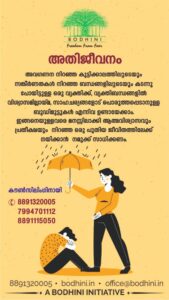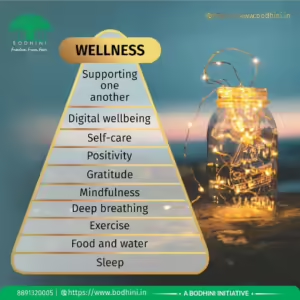
• Your life is not to be defined by other people or their actions.
• If someone has hurt you, it is not your fault; it is because of their shortcomings.
• You have a beautiful life ahead of you; do not let someone else define it.
• Living well is the best gift you can give yourself. Do it every day until it becomes a habit.
• To start with, empower yourself with self-help books, survivor stories, music or movies that inspire you.
• Take care to avoid triggers that remind you of the occasion or pain till you are stronger. Any music, place, people or anything that trigger off memories of the past is to be avoided for a while.
• Get help. Reach out, if there are people taunting or threatening you. People who threaten you are cowards who feed on your fear. The moment you break free of that fear, the perpetrator loses their control over you.
• Push yourself into doing things you love and are passionate about.
• Take care of yourself mentally, physically, and emotionally to make yourself stronger.
• There may be challenges in your healing journey. Find strength not to let other’s emotions and discouragements impede your progress.
• Good music, travel, books, writing, spirituality; for different people, it is different paths. Find your own and move forward.
• The first step to healing is acceptance; accept the situation, without putting yourself down or questioning your role.
• Just as we go to the doctor if our body is unwell; seek counselling support if your mind needs it.
• It takes strength to become a survivor.
• You are strength, you are powerful

• Keep reinforcing the fact that it was not their fault.
• Be there for them whenever they need support.
• Different people have different reactions to trauma, some react, some internalize and some deny. Do not judge them.
• Understand that withdrawal, anger outbursts, repeatedly talking about the assault are all part of the process of healing. The victim is trying to make sense of what happened.
• Make sure they get enough sleep and food.
• Encourage them to go for counselling.
• Get them survivor stories, information on what they are going through and empower them.
• Encourage them to be positive and support each positive step they take.
• Show them good things to look forward to. Like music, nature, books, friends.
• Strengthen their belief in themselves. Reinforce their strengths.

Overcoming a traumatic experience is a difficult task that requires a lot of time and endurance. It is absolutely normal to feel vulnerable and not quite like yourself. The first thing to keep in mind while starting the healing process is that different people react differently to different incidents.
A healing process that might help someone might not help you. Also, not everyone recovers at the same pace; some people require more time. You should not feel disappointed if you feel that your friend or close one is moving on faster than you are. Keep in mind that you don’t know what exactly is going on in that person’s life.
Your life might change after a traumatic incident. You might not feel like yourself. You might feel like nothing will ever be the same again. It might be hard to talk to the persons you used to confide in. You might find it difficult to communicate to the people who are there for you. Things that used to interest you do not anymore. You might have self-destructive thoughts and feel like giving up. Understand that all these are legitimate thoughts and it is completely normal to feel this way.
- Acceptance – The first step towards the healing process is to accept the incident that happened to you. Sometimes, it feels like the traumatic incident that happened to you happened to someone else. It might feel easy to ignore it and pretend that it did not happened to you.
- Understanding – Understand that what happened to you was not your fault. The traumatic incident that happened to you did not come as a punishment for any of your previous act. You did not deserve to go through that experience. You did not invite the incident in any way.
- Take some time off – Take some time off from your normal routine to relax and try to heal yourself. You might not be in a capacity to undertake your normal activities. At the same time, some people might find it easy to bury themselves in work. Choose what is ideal for you, what works best for you.
- Communication – Talking about what happened to you with others will help you understand it better yourself. Sometimes hearing about the experiences of others and how they dealt with unpleasant experiences will help you figure out how to get over your bad experiences and enrich yourself.
- Seek professional help – If you find it difficult to talk about yourself to people who know you or if you feel that your loved ones do not understand you anymore then it might be wise to seek professional help. Enroll yourself in therapy and open yourself. Talk about anything that you feel. A therapist is there to listen to you and help you understand what happened to you and to help you try to move on to have a full life.
- Find the artist within you – Try and do things that relax you. Listen to music, paint, write and keep a journal, dance. Do things that help you express yourself and the artist within you. These activities have been found to have therapeutic effect on people.
- Try new things – If your usual activities do not help you anymore it might be helpful to try new things. Try to have enriching experiences and step out of your hole.
- A healthy routine – For attaining a state of well being, it is important to feel mentally and physically healthy. It is crucial to have a healthy routine in your day-to-day life. Eat balanced meals, have a healthy amount of sleep and sleep on time, do small exercises, meditate and do things that make your life easier.
- Move on – It might feel like moving on is the last thing that might happen to you. Forgetting the experience might not be possible but try not to let it define who you are. You will know when you are finally ready to move on. Proceed through life determined and with a goal in your mind. Celebrate small wins, appreciate the good people in your life, travel and try to leave behind unpleasant memories.
Anger is a completely normal and usually a healthy emotion but, when it turns destructive, it can be a problem. In our daily life, we might come across situations that will make us angry. We must learn to manage the anger and not let the emotion control us.
The goal of anger management is not to never be angry but to express it in a healthier way. This will result in efficient communication, better conflict management, better relationships and is more likely to meet your needs.
- Find the source of anger: If you find yourself constantly irritable and losing temper over inconsequential things, the trigger may not be the immediate incident. There may be underlying reasons. Identifying this can help us to deal with it. Try to find out the underlying frustrations. Anger may be to mask emotions like embarrassment, insecurity, hurt, shame, vulnerability or anxiety. Identify what you are anxious or scared about. It may also be a symptom of underlying health conditions like depression, trauma or chronic stress.
- Identify the triggers: Analyse your routine and pattern. Identify circumstances that always make you angry – like a group of friends or traffic jam. Try to avoid them. If that is not advisable, try to deal with them. Being aware of the pattern gives you a head-start to deal with the issue.
- Be aware of your anger warning signs: There are physical signs of anger in your body. Being aware of your personal sign will help you to manage your anger before it gets out of control. Some common physical signs are:
- Knots in your stomach
- Clenching your hands or jaw
- Feeling flushed or clammy
- Breathing faster
- Headaches
- Pacing or need to walk around
- Having trouble concentrating
- Pounding heart
- Tensing your shoulders
Once you notice your warning signs, remove yourself from the situation or use calming techniques to cool yourself.
- View things differently: Most of the times anger reactions are not due to what happened to you, but the way you interpret and think about the things that happened. There may be a negative thinking pattern. Common patterns include:
- Over generalising: Notice if you are thinking in absolutes like ‘NOBODY respects me’, ‘I am NEVER heard’ etc. Chances are that this is an over-generlisation of some instances.
- Having a rigid view: Having a fixed view of how things should be can cause disappointment when things don’t turn out in that manner. Let go of the “should” and “must.” Be open to the idea that things can be in more than one way.
- Assuming and making inferences: People often make assumption about what others are thinking and make conclusion based on these assumptions. This could be making conclusions like they ‘intentionally upset you’ or ‘intentionally disrespected you’. Remind yourself that everyone is not against you.
- Collecting straws: People sometimes let minor irritations build until the final straw and then explode over something relatively minor. Try not to let conflicts build, and resolve them timely.
- Blaming others: It may not always be others’ fault whenever things go wrong. Stop and introspect. Take responsibility. Finding fault with others everytime something goes wrong can cause unnecessary anger and conflicts. Remember that you cannot always be right and anything which is not done your way may not always be wrong.
- Express anger in a healthy way: The instinctive way to deal with anger is to respond aggressively. Most of us have learned to express anger in this way only since childhood. We have heard that it is healthier to vent out our anger. That does not mean we have to do that aggressively. The better way is to express your emotions assertively without disrespecting the other person. For that, you have to learn to know what your needs are and how they can be met. Once you know that, it can be communicated in a firm and polite manner. This is more effective as the other party knows what you need. Always fight fair. While expressing, it is easy to put past mistakes into the argument. Focus on the present. The objective should be to solve the problem than to assign blame. If you cannot come to an agreement, agree to disagree. Be willing to forgive. Resolving a conflict is impossible if you are unwilling to forgive. If you feel the situation is spiraling out of control and your emotions are boiling over, withdraw from the scene and take time till you cool yourself.
- Learn Techniques to cool yourself: Once you are aware of the warning signs and your triggers, use some techniques to keep your anger at bay. Some of them are:
- Focus on physical sensation of anger: Focusing on the physical signs lessens the emotional intensity of your anger. Notice where your body is tensed and the change in your breathing speed.
- Deep breaths: Take deep breaths from the abdomen. Fill as much air in the lungs as possible.
- Take a walk: Physical activity releases pent-up energy so you can approach the situation with a cooler head.
- Use your senses: Use your sense of sights, smell, touch taste and hearing to take your mind off. Listening to music, looking at old photos can help.
- Stretch or massage: Stretch your body. Massage the areas which are tensed.
- Count to ten: This gives time to the rational brain to catch up. If you are still feeling out of control, start counting again.
- Give yourself a reality check: When you are starting to feel angry, ask yourself these questions. Is it important in the grand scheme of things? Is my response appropriate to the situation? Is there anything I can do about it?
- Long-term Measures: Taking care of your overall mental and physical health will improve your demeanor.
- Manage your stress: If you are constantly stressed, you will find it more difficult to control your temper. Manage your stress by meditation or some other means.
- Get enough sleep: Lack of sleep can leave you irritated and short-tempered. Adequate sleep ensures good mental health.
- Exercise-regularly: It can burn off tension. Regular Exercise leaves you feeling more relaxed and positive.
- Be smart about alcohol and drugs: Alcohol and drugs lowers your inhibition and can make it even harder to control your anger. Even too much caffeine can make you irritable and prone to anger.
- Talk to someone: Talk to someone about your problems. They can provide you a new perspective of the issue and you can view the matter from a different point of view.
- Recognise if you need professional help: If your anger cannot be controlled by you or if it is affecting your relationships and other important parts of your life, or if you are hurting other people you should start considering consulting a mental health professional to learn how to manage your anger.
Some useful links:
- Techniques to manage anger: https://www.youtube.com/watch?v=BsVq5R_F6RA
- Music for anger relief: https://www.youtube.com/watch?v=T235jK9xR8Q
The pandemic has resulted in an increased reliance on the internet and digital devices, as it has become vital for our education, work and even activities such as workouts and social meet-ups. Today, as we spend a great amount of time on our gadgets, we conveniently overlook its effects on our health. Increased screen time has an adverse effect on our physical and mental well-being. Tending to our online health is just as important as planning out a healthy diet. Here are a few steps you could start with:
- Keep an uncluttered space for online work, preferably a space with good air ventilation and light. Try using a table and chair while engaging with gadgets such as laptops. To avoid neck and shoulder aches make sure the screen is at the correct height.
If you are able to look at it without bending your neck down or looking up at the screen. It is also important to keep your back upright and your feet flat on the floor. Check and assess your posture once in a while. - Your eyes can be the worst victim of excessive screen time. To control the strain on your eyes, follow the 20-20-20 rule. For every twenty minutes of screen time, look at something which is twenty feet for twenty seconds. Make sure you blink often. It is also advisable to wash your eyes at frequent intervals.
- Always get a good night’s sleep after a tiring day in front of the screen. A healthy sleep positively impacts your mental health, cognitive abilities and productivity. Avoid screen time just before sleeping as this may increase chances of incessant scrolling in social media platforms or browsing which can push and change your sleep routines and reduce your sleeping time.
- It is always important to hit the reset button from time to time. Take a break from work or classes to do something you like which does not involve an electronic gadget. This could be reading a book, playing an instrument, meditation or playing games with those around you. Reading a book is an excellent activity that can stimulate that part of your brain that involves imagination and creativity.
- Remember to stay hydrated. It’s often forgotten in the course of the indulgence in online learning or working.
- The sedimentary time spent in front of the screen can make you physically unfit as metabolism is low at this period. Regular exercise can counter some of the effects of screen time and even improve cardio-vascular health. It does not necessarily have to be an indoor exercise on your yoga mat; it could be a run around the neighborhood or even cycling. Some studies also suggest that working out mitigates mental health concerns such as anxiety.
- While using social media or browsing platforms, be mindful that they are commercially designed places to maximize the time we spend on them so that they can make revenue from advertisements. Hence make sure you are using the online medium on your own terms and are not controlled by the algorithm that pushes content that we want to see.
This may seem like hard work, but this is the self-care you cannot do without! Make this your priority, and you will thank yourself later.
EMPTY NEST SYNDROME
Empty nest syndrome is a feeling of loneliness or sadness that occurs among parents after children leave home. If you’re having a difficult time dealing with an empty nest:
- Seek support.
- Lean on loved ones and other close contacts for support.
- Share your feelings. If you feel depressed, consult your doctor or a mental health provider.
- Stay positive.
- Thinking about the extra time and energy you might have to devote to your marriage or personal interests may help you adapt to this major life change.
Coping tips:
- Tell them you will miss them, but don’t pass on your anxieties to your child. He’s probably feeling just as anxious and uncertain about his new life on his own as you are. Reassure him of your love and support.
- Mentally prepare yourself for your child leaving home as an important part of his or her positive development, so that you and they are in a better space to deal with it.
- Respect your child’s new independence. Be proud of his achievements and maturity.
- Discuss your feelings with people close to you so that they are around to support you.
- Focus on the future, not the past. Anticipate even happier times to come, such as the joyous times ahead.
- Use your time constructively. Get involved in hobbies, activities, and recreational pursuits.
- Try a new sport and take lessons. Try to exercise regularly and keep fit.
- Think about pursuing educational goals-this may be a great time to get your Undergraduate or Master’s degree.
- Connect with friends.
- Stay active. Try to use your time productively and creatively.
PREMENSTRUAL SYNDROME (PMS)
PMS is a group of changes that can affect you on many levels. They can be physical, emotional, or behavioural. The changes come 1 to 2 weeks before your period. Once your period starts, they go away. It’s estimated that as many as 3 of every 4 menstruating women have experienced some form of premenstrual syndrome. Symptoms tend to recur in a predictable pattern. But the physical and emotional changes you experience with premenstrual syndrome may vary from just slightly noticeable all the way to intense. Still, you don’t have to let these problems control your life. Treatments and lifestyle adjustments can help you reduce or manage the signs and symptoms of premenstrual syndrome.
Symptoms
The list of potential signs and symptoms for premenstrual syndrome is long, but most women only experience a few of these problems.
Emotional and behavioural symptoms
- Tension or anxiety
- Depressed mood
- Crying spells
- Mood swings and irritability or anger
- Appetite changes and food cravings
- Trouble falling asleep (insomnia)
- Social withdrawal
- Poor concentration
- Anger outbursts
- Forgetfulness
Physical signs and symptoms
- Joint or muscle pain
- Headache
- Fatigue
- Weight gain related to fluid retention
- Abdominal bloating
- Breast tenderness.
- Cramps
- Acne flare-ups
- Constipation or diarrhoea
Causes
Girls and women who still get their period can get PMS. But it’s most common in women who are in their late 20s to early 40s. Even though the exact cause of PMS is not known, It probably has to do with changes in your body chemistry around the time of your period.
Some conditions affect PMS, but don’t cause it. PMS can be brought on, or can get worse if you:
▪ Smoke
▪ Are under lots of stress
▪ Don’t exercise
▪ Don’t sleep enough
▪ Drink too much alcohol or eat too much salt, red meat, or sugar
▪ Are depressed
▪ Women with other health problems may find that those problems get worse before their
period. Some of those are migraine headaches, asthma and allergies.
What You Can Do
There are lots of ways to manage PMS. The following tips might help:
- Exercise about 30 minutes a day.
- Eat healthy foods like whole grains, fruits, and vegetables.
- Try to get enough calcium from foods (think dairy, green leafy vegetables)
- Avoid salt, caffeine and alcohol.
- Don’t smoke.
- Get plenty of sleep.
- Work to lower stress.
Premenstrual dysphoric disorder (PMDD)
For some, the physical pain and emotional stress are severe enough to affect their daily lives. Regardless of symptom severity, the signs and symptoms generally disappear within four days of the start of the menstrual period for most women. But a small number of women with premenstrual syndrome have disabling symptoms every month. This form of PMS is called premenstrual dysphoric disorder (PMDD). PMDD signs and symptoms include depression, mood swings, anger, anxiety, feeling overwhelmed, difficulty concentrating, irritability and tension.
When to see a doctor ?
Most women have at least one sign of PMS each month. But it’s not the same for everyone. It can change as you get older. It can be hard to know if you just have a few symptoms before your period, or if it’s really PMS. One way to think about it is to ask the question: “Do these changes get in the way of my regular life? Do they cause trouble at work or with family and friends?” If you answer yes, it might be PMS. Another way to know is if you have symptoms on the 5 days before your period, for 3 months in a row. Women with PMS deal with it in lots of ways. You can make changes to improve your diet, sleep , and exercise . You can also learn ways to relax your mind and body. If what you try doesn’t seem to work, you could talk to your doctor. Some women take vitamins and minerals like folic acid, magnesium, vitamin B-6, vitamin E, and calcium with vitamin D . Others find that herbal remedies help. If you take any vitamins or supplements, check with your doctor first to make sure it’s safe for you.
POST PARTUM DEPRESSION
It usually takes 2-3 weeks until a mother adjusts to new conditions after child birth and it is called baby blues. If it persists longer, it could be post partum depression. It is a mood disorder. 1 in 7 women experience it. It includes feeling stressed, sad, anxious, lonely, tired or weepy following child birth. These feelings go away after sometime, but if persists for a longer duration, it can be PPD. It makes it difficult for the mothers to take care of their baby and themselves. It can affect any woman with easy pregnancies or problem pregnancies, first-time mothers and mothers with one or more children, women who are married and women who are not.
Causes:
- Change in hormone levels after childbirth.
- Previous episode of depression or anxiety or family history of mental illness.
- Stress involved in caring for a new born and managing new life changes.
- Lack of sleep.
- Other emotional stressors, such as the death of a loved one or family problems, financial or employment problems
- Isolation and lack of social support
Symptoms:
- Disturbance in eating and sleep patterns
- Panic attacks
- Feeling guilty or worthless
- Excessive irritability
- Sadness, crying uncontrollably
- Fear of not being a good mother or being left alone with the baby
- Difficulty concentrating, remembering details, or making decisions
- Thoughts of hurting yourself or the baby
If these warning signs or symptoms last longer than 2 weeks, you must get help. Whether your symptoms are mild or severe, recovery is possible with proper treatment. However, it needs to be diagnosed by a professional because its symptoms are broad and vary from person to person.
What can I do?
- Seek professional help
- Acknowledge your feelings, talk with your partner, other mothers, friends, and family
- Find someone who can help you take care of the baby.
- Get good sleep and have balanced diet
- If the doctor permits take walks, get exercise.
- If you are having thoughts of hurting yourself or your baby, take action now:
- Put the baby in a safe place, like a crib. Call a friend or family member for help if you need to.
- Seek professional help.
Stress is a very common aspect of the modern social life. Stress is a normal psychological and physical reaction to a threatening event. It is a signal to your body to release hormones to tackle the threatening situation allowing us to act quickly in the moment. Stress is an ordinary body response and helps us to live life effectively. Stress is not always caused because the body perceives a threat. It can be also due to excitement. This is what we feel when we ride a roller-coaster or go for a first-date.
When Stress is bad?
When you experience stress too frequently or for a long period, it can prove harmful with physical and psychological effects. Stress is bad when it is caused by dealing not with an immediate threat but things in our daily life like planning the future, managing money or due to working long hours on a daily basis.
What causes stress?
- Being under a lot of pressure
- Big changes in life
- Responsibilities that you find overwhelming
- Not having enough work or changes in life
- Worrying about something
- Times of uncertainty
What are the effects of stress?
Stress can affect a person’s health physically and mentally. Long periods of stress can cause headaches, upset stomach, back pain and trouble sleeping. It can trigger existing conditions like migraine. Chronic and prolonged stress can cause high blood pressure, diabetes, heart disease, irregular menstrual cycles, loss of memory and in some cases can cause depression.
How to manage stress
- Maintain a journal. This can help in identifying stress. Record whenever you are feeling stressed. If you record this regularly, a pattern or a theme can be observed after analyzing these. Mention what caused your stress, how you felt emotionally and physically, how you dealt with the situation and what you did to make yourself feel better.
- Smoking, excessive drinking, using drugs or pills, sleeping too much, binging on junk food, procrastination, withdrawing from friends, families and activities and taking your stress out on others are unhealthy ways of dealing with stress. In effect, the problem is not dealt with and there is no improvement in stress management in the long term. This methods work only short term and can sometimes prove harmful. Try to shift to healthier methods of dealing with stress.
- Physical exercise is a widely recommended method of dealing with stress. This can be yoga, dancing orgoing for a walk. Make it interesting. Chose what you enjoy more. Try to incorporate it into your daily life.
- Connect to your social circle. Express what you are feeling. This can be a very cathartic experience. They won’t necessarily fix your problem, but somebody listening itself would help.
- Some stressors can be predictable as it has happened before in such situations. This maybe an office meeting, family gathering etc. In such scenarios, it would be helpful to chose from the 4 A’s – Avoid, Alter, Adapt or Accept
- If the stressful situation is unnecessary, try to avoid them. Learn to say ‘NO’ and fix your own boundaries. This is a self-care measure to take care of yourself and not land yourself in unnecessary stressful situation.
- If it is not an avoidable situation, try to alter it. Communicate the things that are bothering you in an assertive and respectful way. Do not let feelings bottle up. This will increase stress. While communicating your concerns, be ready to compromise. Find a middle ground.
- Better time management will avoid lot of stressful situations. Plan ahead to make sure you don’t over extend yourself. Prioritise the tasks ahead of you.
- Adapt to stressful situation. Regain your sense of control by changing your expectation and perspective. Reframe the problem. Try to approach it in a more positive perspective. Instead of fuming about a traffic jam, look at it as an opportunity to spend some time alone, pause and regroup, listen to your favourite songs.
Take perspective of the situation. Look at the bigger picture. Ask yourself if it matters in a month or year? Is it really worth getting upset over? If not focus your energy elsewhere.
Adjust your standards. Perfection is a major cause of avoidable stress. You are setting up yourself to failure by expecting perfection. Set reasonable standards for yourself and others and learn to be okay with that.
- Accept the things that you can’t change. Death of a loved one, illness, recession etc. are unavoidable stressors. The best way to cope with it is accept the things as they are. The only controllable thing in that situation is your reaction to it. Take unavoidable situations as an opportunity for personal growth. If it is due to your own personal fault, reflect and learn from it. Learn to forgive. Practice gratitude. Look around and appreciate the things you are grateful for. This can help putting things in perspective.
- Practice self-care. Allot some time for rest and relaxation. Do the things you enjoy. Keep your sense of humour and the ability to not take yourself too seriously. Be able to laugh at yourself.
- Mindfulness Apps are available on the internet which can be used for guided meditation. Practicing meditation can help in long term in dealing with stress.
Burnout
Burnout is a state of chronic stress that causes physical and mental exhaustion often along with negative feelings like that of ineffectiveness, lack of accomplishment, cynicism and a lack of interest in things. This in turn affects the professional life with a decline in the job performance. Apart from professional life, it can also cause physical ailments.
Difference between burnout and stress
Burnout may be due to prolonged stress but it is not the same as too much stress. A stressed person may feel she has too much at hand but a burned out person feels emptier than feeling overwhelmed. There is lack of energy and motivation. They don’t think any positive changes will happen in the future. A person will be aware of being stressed but a person is usually not aware if it is a burnout.
What causes burnout
- Lack of adequate social support
- Taking on more responsibilities than one can handle at work or in personal life
- Poor self-care
- Multiple episodes of bad stress over an extended period of time.
Signs/Effects of burnout
Continuous feeling of exhaustion can cause many health problems which include:
- Chronic fatigue. Feeling completely exhausted or drained of energy most of the time
- Even though you feel completely exhausted, you just can’t sleep. This can become persistent in later stages of burnout.
- Physical symptoms include chest pain, palpitation, frequent shortness of breath, stomach-aches and head aches
- Compromised immune system
- Loss of appetite
- Inability to concentrate, reduced attention span
- Increased frequency of negative feelings such as pessimism, frustration and cynicism, decreased degree of satisfaction
- Lack of motivation. This affects the work and can cause low self-esteem
- A feeling of detachment. Participating in isolating behaviour like taking leave from work, coming in late and not participating in any social activities
How to manage burnout
- Take relaxation seriously. Allot time for relaxing and find out any activity for relaxing life meditation, reading a book, cooking, taking a walk etc.
- Find something outside work that you are passionate about and cultivate it. A rich life out of work can help in dealing with burnout.
- Technology while ensuring connectivity can also lead to extension of work after work hours since you are always connected. This includes dealing with and replying to work mails even after work hours. Try to stick to a schedule and disconnect from such technology after work hours. A demarcation between personal and professional life is healthy.
- Less than six hours of sleep is a major cause of burnout. Adequate sleep can replenish your resource and take you out of exhaustion.
- If burnout is due to conditions of work outside your control, try talking to the Manager or HR.
- Consider talking with a mental health professional.
Some mindfulness apps for guided meditation:
Parasympathetic symptoms turn off the flight or fight state of the body and calm it down. Watch the video on Techniques to turn on Parasympathetic Response for dealing with stress at: https://www.youtube.com/watch?v=FPH5CFSmYEU
Deep Healing Music to deal with stress. Listen at:
The one crucial ingredient we have that we take for granted in combating stress and health issues is sleep.
We shouldn’t underestimate the damage that lack of sleep does in creating health issues.
For those facing sleep issues, it’s a vicious cycle which will lead to burnout if you aren’t careful.
Some solutions to fix sleep issues.
1. Go to bed and wake up at a fixed time everyday.
2. Keep the room cooler than your body temperature.
3. Consume enough liquids to stay hydrated.
4. Switch off gadgets an hour before bedtime.
If you have to use them, use apps like f.lux or twilight(or in dark mode ) to reduce the blue light emission.
5. Switch off lights or wear eye masks.
The darkness helps in the production of sleep hormone melatonin.
6. Have a wind down routine one hour before sleeping.( Like relaxation techniques, listening to calming music etc).
7. If you are anxious about the next day’s issues, jot it down on a to-do note,so that you don’t think about it till the next day.
8. If you can’t sleep, get out of bed and do something until you feel sleepy. Go back to bed only when you feel sleepy.
9. Avoid nicotine, caffeine or alcohol close to bed time.
10. Avoid strenuous physical or mental exertion close to bed time.
11. Eat an adequate dinner.
12. Avoid checking time when trying to sleep.
13. Avoid stressing too much about sleep.
Let’s use this superpower to be our strength.
For further support, look up our FB page and blog for videos on sleep.
For further support videos on sleep
https://youtu.be/fk-_SwHhLLc
https://youtu.be/ZKNQ6gsW45M



